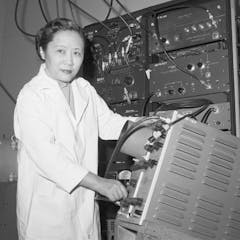
Articles on Manhattan Project
Displaying all articles

The success of ‘Oppenheimer’ at the Academy Awards presents an opportunity to think about critical criteria for viewing historical film — and what we are owed by historical filmmakers.

Nuclear weapons production and testing contaminated many sites across the US and exposed people unknowingly to radiation and toxic materials. Some have gone uncompensated for decades.

Spying was a concern from the dawn of the nuclear age, but charges that J. Robert Oppenheimer, who led the development of the first nuclear weapons, was a Soviet spy have been proved wrong.

The trailer for ‘Oppenheimer’ fails to include female physicists, which is indicative of a broader media trend that, if reversed, could lead to greater gender diversity in science.

Chinese American physicist Wu worked on the Manhattan Project and performed groundbreaking experiments throughout her long career.

Seventy-five years ago, the first atomic bomb exploded and a new world dawned.

In the past, governments have worked much more closely with scientists to respond to emergencies.

Many pieces leading to Alzheimer’s disease have been identified. To put the pieces together, one scholar argues that the government should launch a Manhattan Project-scale effort to find a cure.

Australian scientist Mark Oliphant helped push the development of nuclear weapons during World War II but later riled at US attempts to keep the UK and others out of the nuclear arms race.

During the Cold War, the US built nuclear weapons at a network of secretive sites across the nation. Some are still heavily polluted and threaten public health today.

Canberra’s attitude to nuclear weapons has always been riddled with contradictions. Homegrown nuclear campaigners winning the Nobel prize have put the cat among the pigeons.

By figuring out fission, physicists were able to split uranium atoms and release massive amounts of energy. This Manhattan Project work paved the way both for atomic bombs and nuclear power reactors.

What do intercontinental missiles and Apple’s app store have in common? Alvin M Weinberg.
